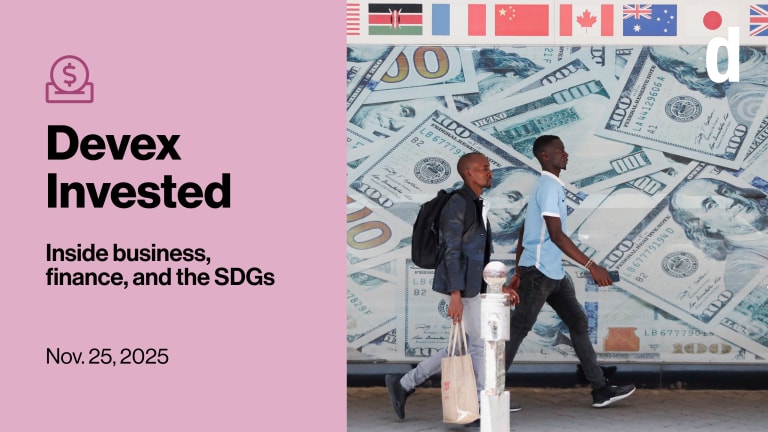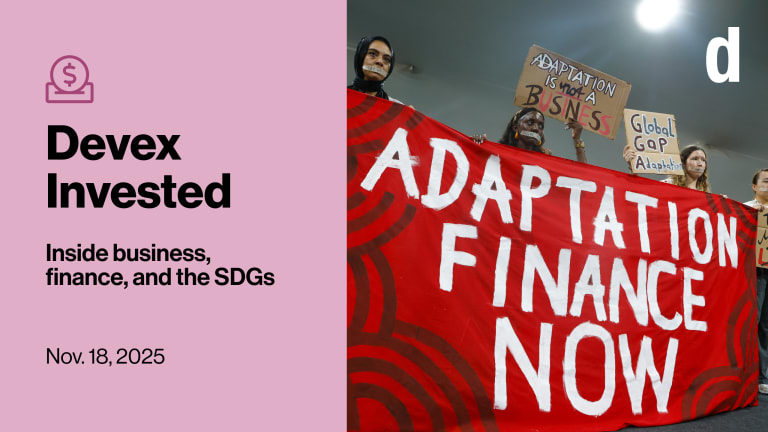Presented by Partners In Health, Pfizer, and BD

As host of the first G20 summit held on African soil, South Africa could seize the moment to shine a spotlight on the issues casting a pall over the global south.
Also in today’s edition: Former Ethiopian Prime Minister Hailemariam Dessalegn pushes the G20 to help Africa become the world’s breadbasket.
+ Upcoming event: On Nov. 20 at 9 a.m. ET (3 p.m. CET), we’ll hear from Temina Madon, cofounder of The Agency Fund, and Namya Mahajan, cofounder of Rocket Learning. They will discuss how funding models can strengthen agencies and accelerate social impact. Save your spot now.
G20 questions
Whoever hosts the annual Group of 20 Leaders’ Summit is in for a world of headaches. How else would you describe wrangling representatives of the planet’s largest economies and trying to get them to agree on, well, anything? And that’s before we consider the world’s ultimate consensus deal-breaker, U.S. President Donald Trump
The South African presidency has the added pressure of symbolically representing an entire continent that many feel has been abandoned by the wealthier parties to the G20. So the country is trying to get the global south back on the radar, according to my colleague Elissa Miolene, who’ll be on the ground in Johannesburg watching the action unfold.
That means emphasizing three themes — solidarity, equality, and sustainability — which translates into a focus on debt burdens, inequality gaps, and financing for a just energy transition, among other priorities tied to international economic cooperation.
“If it wasn’t for South Africa’s G20, I don’t know if Africa would have received the attention that it did,” says Daniel Bradlow of the University of Pretoria. “South Africa has been successful in getting [issues of debt and development finance] a higher profile, and moving it up on the global agenda.”
Getting it on the agenda is one thing; actually getting traction on issues such as debt reform is quite another. Then there’s the big elephant that’s left the room: The U.S., which is boycotting the summit altogether in the wake of Trump’s dubious claims that white South Africans are being “killed and slaughtered.” Leaders from China, Argentina, Russia, and Mexico will also be no-shows.
For Bradlow, the pullouts are something of a “mixed blessing” — unfortunate, because some of the world’s most powerful states are skipping the event, but fortunate, because it could make reaching consensus on other topics easier.
South Africa still has its hands full navigating a geopolitically divided world. But at least it’s still standing.
“Many thought that South Africa would need to concede defeat, and we’re still fighting,” says Oxfam’s Isobel Frye, speaking of her home nation. “It’s like when you’re at the beach and the waves keep on coming. You can either dive under and be irrelevant, or you can stand and wait for the next one to come.”
Read: What are the key issues at stake at the G20 summit in South Africa?
Wheat the people
“Debt has become a silent famine.”
— Former Ethiopian Prime Minister Hailemariam DessalegnWhat’s in it for the world to ease Africa’s debt burden? Food, according to Dessalegn, who chairs the Africa Food Systems Forum. In an opinion piece for Devex, he argues that with 60% of the planet’s uncultivated arable land, Africa could be the breadbasket of the world — but not if debt interest repayments continue eating up government revenue, which creates a cruel paradox: “Africa holds the potential to feed the world but cannot afford to feed itself.”
That’s why Dessalegn says that the G20 needs to rethink its approach to sovereign debt. “Reform is not about canceling obligations but about creating a system that encourages investment and growth,” he writes. “This means faster coordination, greater transparency, and clearer guidance on key aspects of the process to make debt restructuring more effective and predictable.”
“Investing in Africa’s productivity is therefore not an act of charity; it is a strategy for global stability. The war in Ukraine exposed the fragility of supply chains: when Black Sea grain exports stopped, wheat prices surged 70% and food inflation spread worldwide,” he adds. “Food insecurity anywhere now drives inflation, migration, and political unrest everywhere.”
Opinion: Africa can feed the world if the G20 frees it from debt
+ For more content like this, sign up to Devex Dish, a free weekly newsletter on the transformation of the global food system.
Gas giants
Back to the other major global gathering we’re on the ground for this week: the 30th U.N. Climate Change Conference, where more ministers are arriving in Belém, Brazil, for Week 2.
That includes the widely watched environment minister of India, Bhupender Yadav, who had his country’s COP pavilion buzzing yesterday with talk of Like-Minded Developing Countries, or LMDCs, demanding that developed nations show “real climate ambition.”
In his address, Yadav repeated India’s long-standing position that developed countries “must reach net zero far earlier than current target dates” and deliver climate finance “at a scale of trillions, not billions.”
India itself hasn’t yet submitted its updated nationally determined contributions, or NDCs, which do not include cuts to agricultural methane. “What Indian farmers need is not external pressure or arbitrary deadlines, but time and financial support to transition to regenerative, resilient, climate-friendly systems — without compromising the nutritional needs of over a billion people,” climate activist Harjeet Singh, founding director of the Satat Sampada Climate Foundation, told Devex contributing reporter Cheena Kapoor.
Catch up: COP30 reporters’ notebook — Day 8
+ Prepare for the pivotal moments. Our next COP30 special newsletter breaks down what to expect during COP30’s second and final week. It's landing in your inbox soon!
Hub scout
For public development banks, borrowing on capital markets is not always an easy proposition. A new guarantee platform with a unique financing model aims to change that, especially when it comes to scaling up climate finance.
PDBs provide long-term lending in areas where commercial banks are unwilling to venture. Unlike multilateral development banks, which are owned by many countries and borrow cheaply on global markets, PDBs are typically domestic institutions with only one government behind them. That makes them smaller, less well-known to investors, and often viewed as riskier, my colleague Jesse Chase-Lubitz writes.
Enter the Public Development Bank Guarantee Hub — designed to build trust among investors and backed by an array of institutions, including the International Development Finance Club. The IDFC will cover 100% of the losses if a PDB cannot repay investors. IDFC will also provide 50% guarantees for their second bond, and then phase out support entirely once the market becomes comfortable with their creditworthiness.
To do this, the program couples guarantees with technical assistance to banks that do not yet meet governance and reporting standards needed for a bond issuance, says Nicolas Picchiottino of the French Development Agency and secretary general of IDFC.
“For those that already fulfill those criteria, it’s easy, they get the guarantee automatically,” he says. “And for those that don’t … we will have technical assistance to help them and maybe it can take one year or two years.”
Scoop: Guarantee platform aims to unlock more finance for development banks
An ounce of prevention
86 million
—That’s how many girls were immunized by Gavi, the Vaccine Alliance against the human papillomavirus, or HPV — a sexually transmitted infection that can lead to cervical cancer. The organization estimates this will prevent 1.4 million deaths.
It’s the culmination of a goal set by Gavi’s board at the end of 2022.
“That was a very ambitious goal at the time, because in the period between 2012 and 2022 we actually only reached 13 million girls in that whole period,” Gavi’s Emily Kobayashi tells my colleague Sara Jerving, who has a detailed breakdown of how the dramatic scale-up was accomplished.
Gavi is working with a lower budget than it had hoped — its replenishment event in June fell short of its goals, with the U.S. cutting funding to the alliance. And while that means the organization must tighten its focus and make trade-offs, Kobayashi says Gavi remains committed to rolling out the HPV vaccine.
Read: Gavi and partners reached HPV vaccine goal, immunizing 86 million girls
Related: How Gavi is reaching ‘zero-dose’ children in conflict areas (Pro)
+ Not yet a Devex Pro member? Start your 15-day free trial today to access all our expert analyses, insider insights, funding data, events, and more. Check out all the exclusive content available to Pro members.
In other news
Western donor aid cuts could result in up to 22.6 million more deaths in low- and middle-income countries by 2030 and could undo progress in global health and poverty eradication. [Reuters]
The U.N. Security Council on Friday voted 13-0, with China and Russia abstaining, to endorse a U.S.-led Gaza peace plan that includes an international stabilization force and a conditional pathway toward Palestinian statehood. [The Guardian]
The U.N. Human Rights Council has approved a new independent investigation into the mass killings in Sudan’s el-Fasher to identify those responsible amid mounting evidence of atrocities. [BBC]
Sign up to Newswire for an inside look at the biggest stories in global development.








